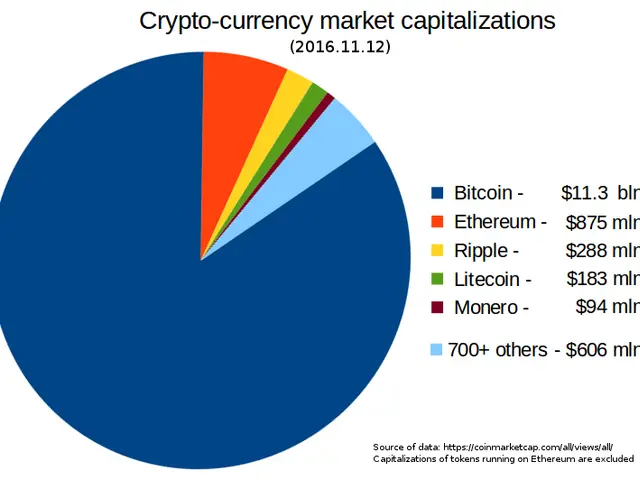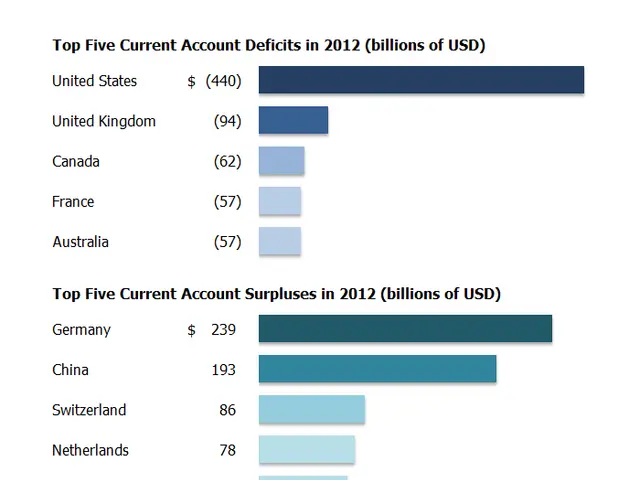In 2024, Bitcoin's Reign: Witnessing Bitcoin's Ascent into Mainstream Culture
2024 will be remembered as the year bitcoin underwent a monumental shift, transitioning from a specialized investment into a widely recognized asset. The digital coin saw its dollar value break the significant $100,000 barrier, and major financial companies worldwide welcomed a bitcoin strategy, effectively rendering its dismissal a thing of the past, despite individual perspectives on bitcoin.
The dawn of 2025 brings a plethora of enticing prospects, such as heightened government adoption, the deployment of bitcoin as a treasury asset by institutions, an overhaul of regulations to make the U.S. more welcoming to financial innovation, and geopolitical forces that could launch bitcoin into a new era.
The Regulatory Shift
January 2025 marked a turning point in the U.S. Securities and Exchange Commission's (SEC) stance on bitcoin, as it approved 11 spot bitcoin exchange-traded funds (ETFs). For years, the SEC had resisted bitcoin ETFs due to concerns over market manipulation and investor safeguards. The approval signified a significant shift in the agency's position, injecting billions of dollars into the market and bolstering confidence in bitcoin as a legitimate asset class. The launch of these ETFs was the most successful in ETF history, currently managing more assets than gold ETFs.
These ETFs have ushered in a wave of fresh liquidity into the bitcoin markets, as some investment pools cannot convert cash into physical bitcoin but can purchase regulated financial instruments like ETFs. Moreover, bitcoin ETFs have popularized bitcoin as an investment option. Pension funds, individual retirement accounts, and institutional portfolios, as well as the financial professionals who manage them, now have the opportunity to gain exposure to bitcoin with the same ease as traditional securities, like stocks and bonds.
A Decrease in Volatility Predicted for 2026?
Institutional adoption of bitcoin reached unprecedented levels in 2024. BNY Mellon, America's oldest bank, received SEC approval to provide custodial services for bitcoin, signaling that even the most conservative institutions now acknowledge the cryptocurrency's longevity.
Simultaneously, BlackRock, the world's leading asset manager, received approval for the iShares Bitcoin Trust to facilitate spot bitcoin ETF options. This cleared the way for more effective price discovery, which could potentially dampen bitcoin's price volatility in 2026.
Although volatility has its merits, it does deter certain investors from entering the market. Reduced volatility might encourage increased investor confidence in the asset, leading to even more inflows, further promoting price discovery, and subsequently lowering volatility, thereby establishing a beneficial cycle of adoption and appreciation of bitcoin as an asset class.
Corporate Vanguards Lead the Advance
Bitcoin's mainstream acceptance was further fueled by pioneering corporate leaders. MicroStrategy, already well-known for its bitcoin ventures, announced plans to raise $42 billion over a three-year period to expand its bitcoin holdings. Since then, the company has pursued additional SEC filings to issue even more shares to purchase even more bitcoin. MicroStrategy's unique treasury operations will likely be scrutinized and studied for years to come.
Inspired by MicroStrategy's strides, a handful of other companies joined the bandwagon in 2024, including Semler Scientific and Metaplanet. In recent developments, SEC filings reveal several new bitcoin ETFs on the horizon:

- Bitwise has submitted an application for a "Bitcoin Standard Corporations" ETF, which would include stock shares of companies holding bitcoin as part of their treasuries.
- Strive Asset Management, a firm connected to Vivek Ramaswamy, has filed for a "bitcoin bond" ETF, which would offer exposure to MicroStrategy's convertible bonds.
- Following a similar approach, the REX Shares Bitcoin Corporate Treasury Convertible Bond ETF would invest in convertible bonds issued by companies with bitcoin in their balance sheets.
- ProShares has submitted an application for a hedged ETF, which would "strategically pair long positions in stocks or gold with short positions on the U.S. dollar, complemented by long positions in Bitcoin through futures contracts."
A Pro-Bitcoin Administration
It's plain to see that in one of the fiercest presidential elections in U.S. history, Americans elected a pro-bitcoin president in a landslide victory. Throughout his bid to reclaim the White House, Donald Trump expressed his support for bitcoin and even delivered a keynote speech at the Bitcoin Conference in Nashville.
Key figures within the Trump administration have voiced their support for bitcoin, such as RFK Jr., Tulsi Gabbard, Don Jr., Vivek Ramaswamy, and others. Meanwhile, Congress has entered the fray, with U.S. Senator Cynthia Lummis championing a proposal to create a Strategic Bitcoin Reserve (SBR).
An SBR would place the U.S. as a global leader in sound currency, leveraging bitcoin as both a hedge and an asset of geopolitical value – and could even aid in restoring separation of powers within the federal government. Facing significant economic challenges, the incoming administration would benefit from viewing bitcoin as a valuable tool to navigate them.
Where Will Bitcoin Go in 2026 and Beyond?
As we near the end of 2024, bitcoin's market capitalization has surpassed that of silver and even Saudi Aramco, one of the world's most valuable companies. With the temporary breaching of the $100,000 price threshold, curiosity naturally arises about what the price will be a year from now.
The occurrences of 2024 indicate that the surge isn't slowing down any time soon. Established organizations are still hopping on board, regulators are becoming more accepting of Bitcoin, and public curiosity is peaking. Given these factors, 2025 might witness further price increases. Figures such as $250,000 and $475,000 are frequently mentioned. Chamath Palihapitiya has estimated a Bitcoin price range of $500,000 to $1,140,000 for the duration of the current halving period, which concludes in 2028.
Given the numerous aspects influencing the price, it's challenging to set precise expectations. Thankfully, there's no need – Bitcoin is an investment tool that's ideal for creating multi-generational wealth gradually and steadily over the long term. Bitcoin's Compound Annual Growth Rate (CAGR) is roughly 25% to 40% within a five-year timeframe. Consequently, price fluctuations, even over two or three years, should be viewed as temporary setbacks. The most effective method to amass wealth with Bitcoin is to allocate funds that you can afford to leave untouched for at least five years, and devise a saving plan tailored to your circumstances.
The extraordinary happenings of 2024 have taught us one incontrovertible fact: Bitcoin is a ubiquitous term that's here to stay. Its monetary characteristics provide resilience and dependability that no other asset can match.
Bitcoin's unprecedented approval of 11 spot ETFs by the SEC in January 2025 brought in billions of dollars and boosted confidence, leading major financial companies to adopt a bitcoin strategy.
The successful launch of these ETFs has made it easier for institutional investors like pension funds and individual retirement accounts to gain exposure to bitcoin, just like traditional securities.
In 2025, with increased institutional adoption and the launch of spot Bitcoin ETFs, the potential decrease in volatility was predicted, which could encourage more investor confidence and further promote the adoption of bitcoin as an asset class.








